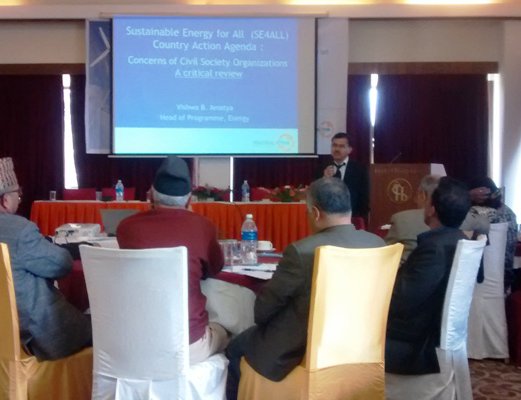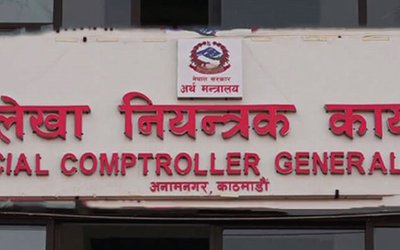
Energy is a key component of poverty alleviation and development and the access to sustainable energy is a perquisite for social transformation. With a half of the population living without energy access, Nepal is far away from providing energy access to all.
Nepal’s experiences have shown that access to energy has drastically changed the education status and had economic implications in the poor and vulnerable communities.
As women, children and health sectors are badly affected by the sustainable energy for all, Nepal government is giving priority to them. Although two years have already passed since the announcement of the decade of Sustainable Energy for All 2014-2024, Nepal is still in the process of preparation of national documents.
At a program organized by Practical Action Nepal Office in collaboration with Center for Rural Technology, participants from various civil society organizations expressed their views on SE4ALL as the country action agenda.
Upendra Shrestha from Practical Action chaired the function where Ganesh Man Shrestha of Center for Rural Technology stressed the need for a vibrant role of civil society organizations to provide reliable and sustainable energy to all.
Although Nepal is determined to act to make sustainable energy for all a reality and help to eradicate poverty and lead to sustainable development and global prosperity through this, it is not easy for all.
“We have been working to enhance the renewable energy through the use of solar, wind and micro hydro powers. Reliable and uninterrupted supply of energy has drastic impacts in rural areas,” said Ram Prasad Dhital, Executive Director of AEPC.
Energy is one of the key components of Sustainable Development Goals for the Post-2015 Development Agenda. “As Nepal is a party of declaration, the government has assigned National Planning Commission as the focal point. With support from UNDP, we are already in the process of finalizing the agenda. This workshop will provide us with the voice of civil society organizations,” said Gopi Mainali, joint secretary of National Planning Commission.
“With long experiences of working in the renewable energy sector in Nepal, Practical Action Nepal can suggest ways of providing sustainable renewable energy in rural Nepal,” said Upendra Shrestha from Practical Action.
Experiences have shown that energy is the golden thread that connects economic growth, increased social equity and a healthy environment. The Sustainable Energy for All (SE4ALL) initiative is helping to realize the vision agreed at Rio+20 by catalyzing major new investments, facilitating new public-private partnerships, and mobilizing bold commitments and actions that will have a transformative impact towards the achievement of three targets by 2030:
“Ensuring universal access to modern energy services; doubling the global rate of improvement in energy efficiency; and doubling the share of renewable energy in the global energy mix are important,” said Suman Basnet, presenting Action Agenda of Nepal.
SEF4ALL is a process transitioning from the fossil fuel economy to low carbon solutions. “Sustainable energy does not mean access to national grid only but it means access to reliable and uninterrupted energy supply,” said Viswa Bahadur Amatya from Practical Action.
Presenting gender dynamics Indira Shakya has shown how access to energy has transformed their lives and the lives of their children. "With the access to sustainable energy means higher literacy rate and empowerment of women."
There is a real need for the SE4ALL process to reach out more broadly not only to the energy supply side and the traditional actors in this space but also to the energy demand side as the needs and voices of the energy users need to be heard.
Sustainable energy includes the power that comes from water, wind, the sun and the incredible energy transformation systems such as photosynthesis, micro- organisms, and natural carbon capture.
The new energy solutions promoted by SE4ALL in order to be truly sustainable will need to be economically viable, socially acceptable to all and - nature friendly to still be valid solutions for future generations. This is why the energy topic fits so well within the SD.
“We understand that adequate supply and consumption of quality, reliable and sustainable energy are requisites to achieve the socio-economic growth required to attain this goal, ” said Mainali.
As the government is preparing the Country Action Agenda for SE4ALL,the interaction program gave a much-needed input to the National Planning Commission on the role of civil society organizations.
- TANAHU HYDROPOWER PROEJCT: A Significant Achievement
- Apr 15, 2024
- AMBASSADOR HANAN GODAR: Sharing Pain With A Nepali Family
- Mar 30, 2024
- VISIT OF KfW AND EIB TO NEPAL : Mission Matters
- Mar 25, 2024
- NEPAL BRITAIN SOCIETY: Pratima Pande's Leadership
- Mar 24, 2024
- NEPAL ARMY DAY: Time To Recall Glory
- Mar 15, 2024
















